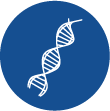Let’s prevent cancer through screening
In 2020, the World Health Organization (WHO) reported a very high number of deaths from cancer reaching almost 10 million. In the same year, the number of new cancer cases rose to 18.1 million, with the highest being breast cancer at 2.3 million and lung cancer at 2.2 million respectively.
Avoidance of cancer risk factors, such as smoking, alcohol use, unhealthy diet, lack of exercise, and air pollution, together with early cancer screening can reduce the risk of developing cancer by 30-50%. If the abnormality can be detected early and treated before it progresses, the chances of death can be decreased.
Cancer often does not show symptoms in its early stages, therefore cancer screening is very helpful in detecting its risk. Currently, there are various methods of examination as below:
1. Testing for tumor markers from the blood can help screen the risk of certain cancers, such as
- Alpha-fetoprotein (AFP): often higher than normal in patients with liver cancer (Hepatocellular carcinoma) and ovarian or testicular embryonal cell carcinoma.
- Carcinoembryonic antigen (CEA): often abnormally high in patients with various gastrointestinal cancers, pancreatic cancer, lung cancer, ovarian cancer, as well as breast cancer. In particular, patients with colorectal cancer have found higher CEA values more often than other cancers.
- Prostate-specific antigen (PSA): to look at the risk of prostate cancer and benign prostatic hyperplasia (BPH) in males.
- Cancer antigens (CA15-3): to screen for breast cancer in females.
- Cancer antigens (CA125): to check for non-mucinous type ovarian cancer.
- Cancer antigens (CA19-9): to examine for pancreatic cancer and bile duct cancer.
2. Pap Smear or Pap Test to screen for cervical cancer
The doctor will use a medical equipment inserted into the vagina to collect cells from the uterus for laboratory testing to check for abnormal cells or cells that may develop into cancer cells, in addition to test for the human papillomavirus (HPV), which can increase the risk of cervical cancer.
It is recommended that women get a Pap smear test after they had been sexually active for 3 years, or at age 25 and should have the test every 1-2 years.
3. Mammogram
Mammogram is a breast imaging that can differentiate different tissues and fat to find abnormalities at an early stage. It is an effective method to detect plaque in the breast. Women aged 40 and over are recommended to take a mammogram every year.
4. Epitope Detection in Monocytes (EDIM)
This is one of the technologies that help screen for early detection cancer by examining monocyte white blood cells that have been stimulated to become macrophages, which are responsible for consuming foreign substances throughout the body including bacteria, deteriorating cells and cancer cells. Consequently, abnormal cell fragments can be found inside the macrophages. In this measurement, two key markers, the DNaseX and TKTL1 genes, are used to calculate the score and determine the risk of abnormal cells developing into cancer cells.
Cancer is a life-threatening disease that requires both money and time for long treatment. However, if we adjust our lifestyle, take care of our health, and regularly check up and screen for cancer, it will reduce the chances of death and illness from cancer and ultimately leading to a long and quality life.
LINE: @bdmswellnessclinic or https://lin.ee/Z4So1yQ
References:
- Cancer of any site - cancer stat facts [Internet]. SEER. [cited 2023Jan17]. Available from: https://seer.cancer.gov/statfacts/html/all.html
- Worldwide cancer data: World cancer research fund international [Internet]. WCRF International. 2022 [cited 2023Jan17]. Available from: https://www.wcrf.org/cancer-trends/worldwide-cancer-data/
- Cancer [Internet]. World Health Organization. World Health Organization; [cited 2023Jan17]. Available from: https://www.who.int/news-room/fact-sheets/detail/cancer
- Chittithaworn S, Charakorn C, Kongsawatvorakul C. Cervical cancer screening guidelines: An updated review. Thai Journal of Obstetrics and Gynaecology. 2021:186-90.




